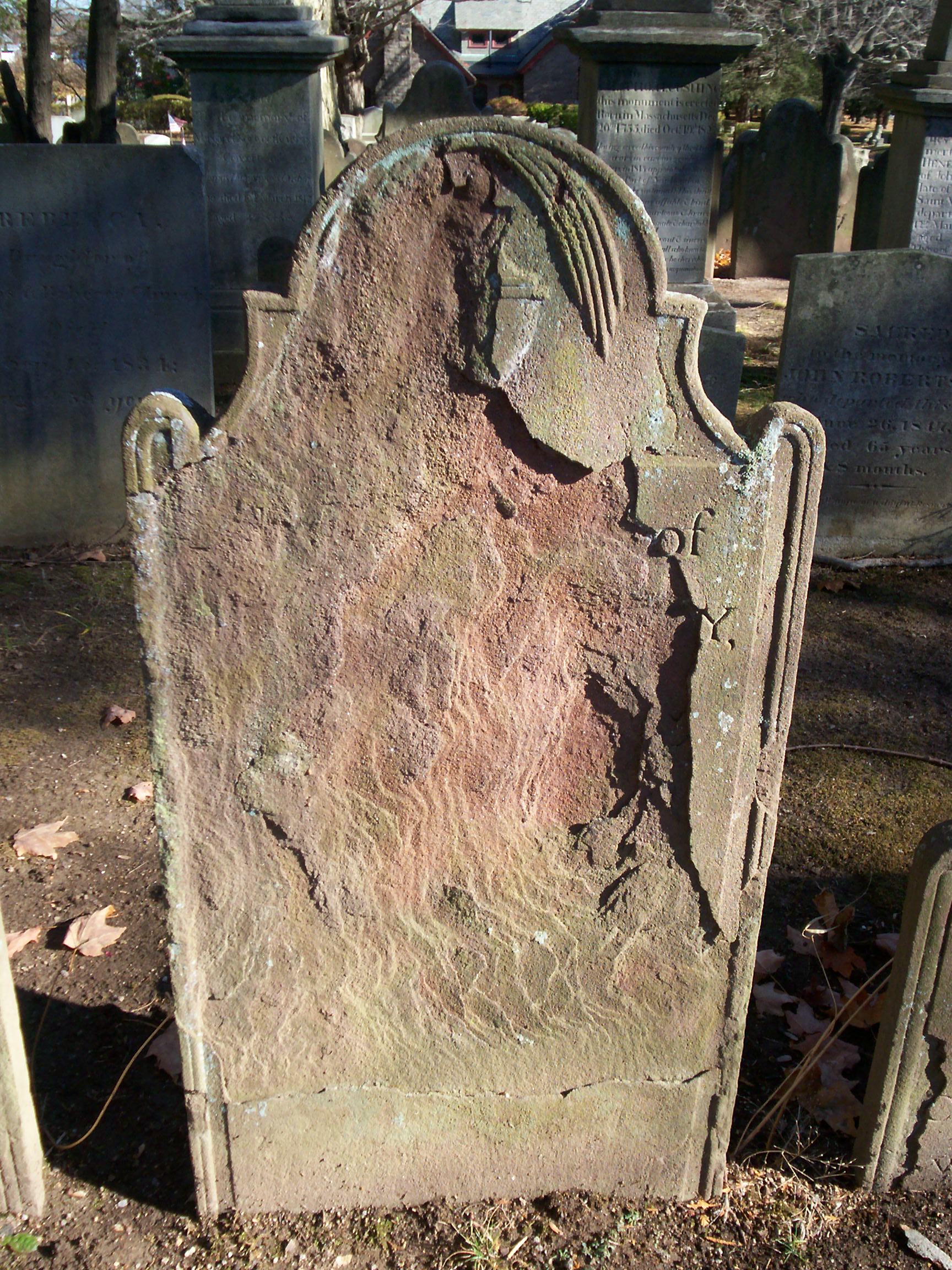I have a fascination with cemeteries bordering on obsession. I grew up in central Connecticut where old cemeteries were everywhere. Old, as in 250 plus years old. My hometown has several. Our town of Rocky Hill has a really good cemetery filled with brownstone gravestones. Surrounding towns have them.
One of the things that interested me (and still does) is the material used for gravestones in Connecticut. It’s commonly called brownstone. It’s all over the place in Connecticut. It’s a sandstone that ranges in color from a rusty color all the way to a purplish-brown. There are different grades of hardness, the rusty colored stone generally being softer, and the purplish stone harder.
Because of this, I have always been able to spot these brownstone gravestones. One startling example is in Monmouth, Maine, where my family and I lived for eight years. Next door to the church was a cemetery that dates from the 1790’s, which for that part of Maine is about as old as they get. In the oldest section in the front are a number of graves simply marked by a flat piece of rock. Some have initials and a date, some just initials, and some have no markings at all. This indicates that there were no trained gravestone carvers in the fledgling community, and families used whatever they could to mark the grave of a loved one.
In the very front row of this cemetery is a pair of brownstone gravestones that would easily blend in in a Connecticut cemetery but which stand out dramatically in the cemetery in Monmouth. My thanks go to Bobbie Bowler of Monmouth who sent me photos of the gravestones. They mark the graves of Samuel Avery and two of his children. Samuel, whose wife was named Jerusha, Samuel was born on May 12, 1774 in Groton, Connecticut, son of William and Mary Avery, and died at the age of 26 on June 8, 1799. Samuel Avery and Jerusha Arnold were married on June 26, 1796 in New London, Connecticut,
 | ||||
| Gravestone of Samuel Avery, Monmouth, Maine Photos courtesy of Bobbie Bowler |
I have wondered what the cause of Samuel's death was. Was it accidental, or illness? Recently I came across his will online and it confirms that he was ill for over a month prior to his death. His will of April 23, 1799, in Kennebec County Probate records, is brief and reads as follows:
In the name of GOD amen
I Samuel Avery of Monmouth and County of Kennebec and Commonwealth of Massachusetts being weak in body, but of sound and perfect mind and memory, blessed be Almighty GOD for the same, do make and publish this my last Will and Testament, in manner & form following (which is to say) I give and bequeath unto my beloved Wife Jerusha Avery, all my Estate real and personal, of what kind name or nature four, and wherever to be found and I hereby appoint John Arnold of New London and County of New London, and State of Connecticut Merchant, sole Executor of this my last Will and testament, hereby revoking all former Wills by me made.
In witness whereof, I have hereunto set my hand and seal this twenty third day of April, in the year of our Lord one thousand seven hundred and ninety nine.
His executor was John Arnold, a merchant of New London, and his father-in-law. This is important because it confirms that the couple's New London family was actively in contact with them, and Arnold was undoubtedly the person who arranged for the gravestones.
 | ||||||||
| Gravestone of Avery children, Monmouth, Maine |
A tragic ending for a young family, to be sure. It’s not surprising that Jerusha would die so soon after losing both of her children and her husband. The stress she undoubtedly experienced in her grief could have been enough to kill her. Did she move back to Connecticut to be with her family after their deaths? Probably. In that part of Maine at that time marriage prospects would have been minimal, and a single woman would have been in some danger.
It is clear that Samuel and Jerusha came from a family with means. In a cemetery that at the time had nothing but flatrocks for gravestones the two brownstone gravestones would have stood out. Here was a young couple who moved their two children to a remote place. Was it for speculation in land? It wouldn’t be surprising. Whatever the reason, when Samuel and the children died someone clearly arranged for gravestones to be made in Connecticut and shipped up. That in itself would have been an undertaking. Shipping them by sea wouldn’t be difficult. They would have come up the Kennebec River and unloaded at Hallowell or Augusta, the transported by land. Given the lack of roads that alone would have been a major undertaking, done at great cost.
 | |||||||||||
| Gravestone of Jerusha Avery, Cedar Grove Cemetery, New London, Connecticut https://www.findagrave.com/memorial/83985082/jerusha-avery |
There they lie buried in a foreign place. It’s a story that has been lived out again and again. Young people pick up and move to a new place for adventure, in pursuit of wealth, or just to get away from civilization. Whatever their reason for going to Maine, they left behind two little pieces of Connecticut in the place that brought them only hardship and death.
Jerusha's stone, made out of Connecticut brownstone, has suffered the same fate as that of her children. Most of the face of the stone is gone, and only cemetery records now indicate who is buried there. There she lies, forgotten to most.

